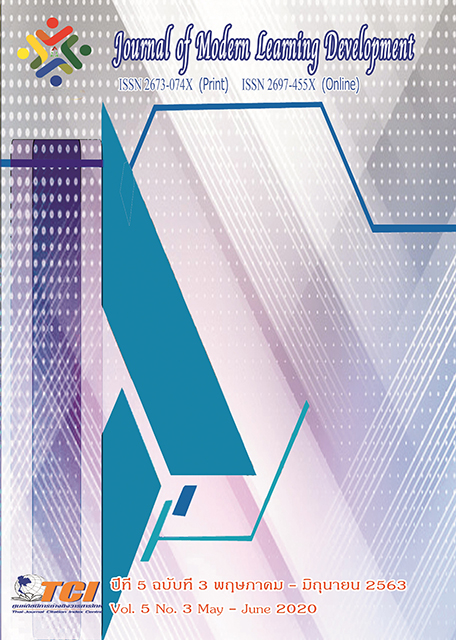แนวทางการประยุกต์ใช้หลักพุทธธรรมในการแก้ไขปัญหาหนี้สินครูในสังกัดสำนักงานเขตพื้นที่การศึกษาประถมศึกษาขอนแก่น เขต 5
Main Article Content
บทคัดย่อ
การวิจัยครั้งนี้มีวัตถุประสงค์เพื่อ 1. ศึกษาหลักพุทธธรรมเกี่ยวกับแนวทางการแก้ไขปัญหาหนี้สิน 2. ศึกษาสภาพปัญหาหนี้สินของครูในสังกัดสำนักงานเขตพื้นที่การศึกษาประถมศึกษาขอนแก่น เขต 5 และ 3. เสนอแนวทางการประยุกต์ใช้หลักพุทธธรรมในการแก้ไขปัญหาหนี้สินครูในสังกัดสำนักงานเขตพื้นที่การศึกษาประถมศึกษาขอนแก่น เขต 5 เป็นการวิจัยแบบผสมระหว่างการวิจัยเชิงปริมาณและการวิจัยเชิงคุณภาพ เครื่องที่ใช้ในการวิจัย ได้แก่ แบบสอบถามและแบบสัมภาษณ์ กลุ่มตัวอย่าง คือ ครูในสังกัดสำนักงานเขตพื้นที่การศึกษาประถมศึกษาขอนแก่น เขต 5 จำนวน 118 คน และเลือกเฉพาะกลุ่มครูที่มีหนี้สินแบบเจาะจง (Purposive Sampling) เพื่อตอบแบบสัมภาษณ์ จากครูในสังกัดสำนักงานเขตพื้นที่การศึกษาขอนแก่น เขต 5 จาก 7 อำเภอ รวมจำนวนทั้งสิ้น 21 คน วิเคราะห์ข้อมูลด้วยค่าเฉลี่ย ส่วนเบี่ยงเบนมาตรฐาน และเสนอข้อมูลเชิงพรรณนาวิธี
ผลการศึกษาพบว่า หลักพุทธธรรมเกี่ยวกับแนวทางการแก้ไขปัญหาหนี้สินครู ประกอบด้วย หลักฆราวาสธรรม 4 สัจจะ ทมะ ขันติ จาคะ หลักคิหิสุข อัตถิสุข โภคสุข อนณสุข อนวัชช โภควิภาค 4 ส่วนใช้จ่ายเลี้ยงตน เลี้ยงคนที่ควรบำรุง และทำประโยชน์ สันโดษ ยถาลาภสันโดษ ยถาพลสันโดษ ยถาสารุปปสันโดษ และละเว้นจากอบายมุข 4 อิตถีธุตตะ สุราธุตตะ อักขธุตตะ ปาปมิตตะ และอบายมุข 6 ติดสุราและของมึนเมา ชอบเที่ยวกลางคืน ชอบเที่ยวดูการละเล่น ติดการพนัน คบคนชั่ว เกียจคร้านการงาน)
สภาพปัญหาหนี้สินของครูในสังกัดสำนักงานเขตพื้นที่การศึกษาประถมศึกษาขอนแก่น เขต 5 เกิดจากค่าใช้จ่ายเกี่ยวกับค่าใช้จ่ายในด้านตนเอง ค่าใช้จ่ายในด้านครอบครัว ค่าใช้จ่ายในด้านการงานและค่าใช้จ่ายในด้านสังคม มีค่าเฉลี่ย 3.41 ซึ่งอยู่ในระดับมาก ทำให้เกิดผลกระทบเกี่ยวกับการดำเนินชีวิต มีค่าเฉลี่ย 3.52 ซึ่งอยู่ในระดับมาก
แนวทางการใช้หลักพุทธธรรมในการแก้ไขปัญหาหนี้สินครู ควรปรับเปลี่ยนทัศนคติและค่านิยมการดำเนินชีวิตให้สอดคล้องกับพุทธธรรมในแต่ละข้อดังนี้ ด้านตนเอง ใช้หลักฆราวาสธรรม มาใช้ในการดำเนินชีวิต พบว่ามีระดับการปฏิบัติเฉลี่ย 3.97 ซึ่งอยู่ในระดับมาก ใช้หลักคิหิสุขในการแก้ปัญหาหนี้สิน โดย จากการสอบถามว่ามีระดับการปฏิบัติเฉลี่ย 4.27 ซึ่งอยู่ในระดับมากที่สุด ด้านครอบครัว ใช้หลักโภควิภาค 4 พบว่ามีการปฏิบัติเฉลี่ย 3.91 ซึ่งอยู่ในระดับมาก ด้านการงานใช้หลักสันโดษ ซึ่งมีการปฏิบัติเฉลี่ย 4.04 ซึ่งอยู่ในระดับมาก และด้านสังคมใช้การงดเว้นจากอบายมุข 4 และอบายมุข 6 ได้แก่ งดเที่ยว ไม่ดื่มสุราของมึนเมา ไม่คบคนชั่วเป็นมิตร ไม่เที่ยวกลางคืน ไม่เล่นการละเล่นที่มีโทษ ไม่เกียจคร้าน มีความขยันในการทำงานมากขึ้น ทำให้เกิดความสุขในการดำเนินชีวิตด้วยเช่นกัน มีระดับการปฏิบัติเฉลี่ย 4.51 ซึ่งอยู่ในระดับมากที่สุด
Article Details
เอกสารอ้างอิง
กัลยา คิดก่อนทำ. (2555). รูปแบบเพื่อการพัฒนาชีวิตครูที่พึงประสงค์ตามหลักพุทธธรรม. วิทยานิพนธ์พุทธศาสตรดุษฎีบัณฑิต. บัณฑิตวิทยาลัย: มหาวิทยาลัยมหาจุฬาลงกรราชวิทยาลัย.
กานต์สินี จันทร์วิภาดิลก. (2551). การศึกษาวิเคราะห์ระบบวิธีคิดเพื่อการดำเนินชีวิตตามแนวพุทธศาสน์., วิทยานิพนธ์พุทธศาสตรมหาบัณฑิต. บัณฑิตวิทยาลัย: มหาวิทยาลัยมหาจุฬาลงกรณราชวิทยาลัย.
บุญชม ศรีสะอาด.(2538) การวิจัยเบื้องต้น. (พิมพ์ครั้งที่ 2). กรุงเทพมหานคร: สุวีริยาสาส์น.
บุญชู ไตรรัตน์รังษี 2539 ทัศนคติต่อการเป็นหนี้ ค่านิยมทางวัตถุ และการเป็นหนี้ของครูโรงเรียนเอกชนในเขตบึงกุ่ม กรุงเทพมหานคร. วิทยานิพนธ์พัฒนาสังคม. บัณฑิตวิทยาลัย: สถาบันบัณฑิตพัฒนบริหารศาสตร์.
รุ่ง แก้วแดง. (2540). ประวัติการศึกษาไทย. กรุงเทพมหานคร: มติชน.
ศูนย์พัฒนาคุณภาพชีวิตครู. (2554). การศึกษาสภาพทางเศรษฐกิจและการเงินของข้าราชการครูและบุคลากรทางการศึกษา สังกัดสํานักงานส่งเสริมการศึกษานอกระบบและการศึกษาตามอัธยาศัย.กรุงเทพมหานคร: สํานักงานคณะกรรมการส่งเสริมสวัสดิการและสวัสดิภาพครูและบุคลากรทางการศึกษา กระทรวงศึกษาธิการ.
สำนักงานข้าราชการครู. (2542). การสำรวจหนี้สินข้าราชการครู. กรุงเทพมหานคร: ศูนย์พิมพ์คุรุสภา.


